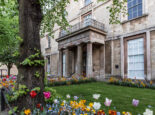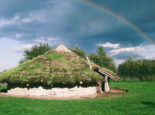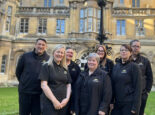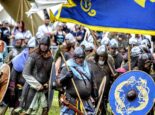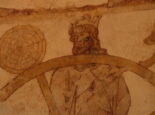David Starkey: “A new town has been wrapped around something very remarkable…”

After giving a fascinating talk on Peterborough past, David Starkey talked exclusively to The Moment about his thoughts on Peterborough past, present and future…
In your talk you were at pains to point out the connections of history with the here and now – that it is a continuity. Is this something we overlook at our peril?
The connection with now is always there. The point is best put by a very remarkable American historian of the last generation – the generation that taught me – called J H Hexter, who talks about the historian as having two ‘presents’: there’s the time the historian lives in and the time the historian writes about. Your role is as a kind of interpreter between the two. There are risks in that relationship. If it tips too much into the present, it becomes mere anachronism; you present the past purely in terms of the present. You can transform an Anne Boleyn or Elizabeth I into standard bearers for modern feminism, but really this is just silly. There is such a confusion in our attitude to Katharine of Aragon, mixing it up with modern women’s rights because she is defiant in the face of Henry’s demands. But the way she sees that is very different – that marriage is an absolutely unbreakable destiny. On the other hand, you can just go into a mindless antiquarianism, rejoicing in the peculiarities and eccentricities of the past for its own sake. Both of those are equally dead and equally deadly. We need to confront other times on their own terms, recognise their own values but at the same time never lose sight of our own.
Peterborough’s sense of identity is shifting faster, can awareness of history help it form a sense of its own identity as it goes into the future?
I think it can help it cope with its present. What the future is, God only knows! I think one of the challenges with Peterborough is that there has as been this attempt to transform it and remake it anew, while on the other hand there is this extraordinary antiquity and beauty with the Cathedral. A new town has been wrapped around something very ancient and very remarkable. And I think that the only way a place like that is going to work is when there is an integration of old and new, and the example of the chorister of a different faith is a fascinating instance of that. In many places, partly as a result of Brexit, partly as a result of social and economic turmoil, there is a very real desire for some sort of identity, and if new Peterborough does not have an identity then by definition it has to forge a new one. Or a renewed one. But the components of history will be an absolutely fundamental part of that.
But you don’t see this as a kind of multi-culturalism?
‘Multi-cultural’ is not quite what I think modern Peterborough is. I think what is happening with the best of this new world is a bi-culturalism – as in my example of the child from another faith singing in an Anglican choir. That child has two very clear cultural anchors.
As soon as you use the term ‘Anglo-Norman’ in relation to England just after the conquest you are implying something very similar…
Yes, you have exactly that process. What is remarkable, in that example, is that the conqueror’s identity – that of the incoming Normans – very rapidly becomes subordinate to the native tradition, so although you have the great Anglo-Norman barons at the signing of Magna Carta whose first language is French, they speak of themselves as English and having the rights of Englishmen, and invoke Edward the Confessor – the last agreed Anglo Saxon king – as the origin of their rights and privileges. The immigrant experience – the coming of the Anglo Saxons and the Normans, with its fusion of identities – is absolutely fundamental to Englishness. That immigrant experience is of such profound cultural significance. English is a fused identity.
You mentioned the turmoil of Brexit – and drew parallels with the Reformation. Can we learn valuable lessons from that historical experience?
Another thing that I did not talk about in detail is Magna Carta, which is astonishingly similar to how I imagine Brexit will work. In 1215 you have this wildly radical document that could never have been made to work. Then, within a year, wiser heads prevail and you come up with this nice, middle-ground solution, and you spend the next couple of decades trying to make sure it works out. I would guess something pretty similar is going to happen with Brexit. But the other thing that we need to remember – and this is really what I was talking about at Peterborough – is that everybody, including politicians, talks as if the big questions have solutions. The truth is, they don’t. There are just a whole series of choices which often, if not evil, are not very good! Often the question comes up about learning from history – which, obviously, no one ever does – and the answer to that, really is very simple. Why do teenagers never learn from the experiences of their parents? Well, because your parents errors aren’t your errors. Human society is very similar – and the big questions of identity, of the balance between order and freedom, between the individual and the collective – these come back, and back, and back.
You also said there was a direct line from Henry VIII to Nigel Farage. Do you think they would have got on?
I think they would have had quite a lot in common! There’s a kind of parody masculinity that they share. They might not have got on too badly – until Nigel stepped out of line and something horrible happened to him. Henry could be remarkably tolerant in his personal dealings with people, but the thing that would have done for Nige would have been political dissent. That was not tolerated.
Looking to the city’s future, what part do you think the Cathedral has to play in that?
The Cathedral is overwhelmingly the biggest, noblest, most striking human structure there. Those things are profoundly important. When you come to Peterborough there is this single huge thing – which also happens to be very lovely – which is impregnated with a whole range of meanings acquired across its history of a thousand years.
And it stands for continuity, because it has been in continuous use…
It’s continuity and fragility, which is another point I made. These things are fragile and vulnerable. There is the threat of neglect. Consciously to knock down the Cathedral would be jolly difficult, but all you need to do to destroy it is to take the roof off and let the weather do the rest. That was the fate of monasteries all over Britain. As a standing structure, the Cathedral – or Abbey, or whatever you wish to call it – takes us back directly to all these things we have been talking about. It also remains a functioning institution, and one you can be a part of. As a place where identities have been redefined, changed, fought over, that is almost an emblem of what will be the new England.
Read the companion piece, David Starkey’s speech at Peterborough Cathedral, here.








